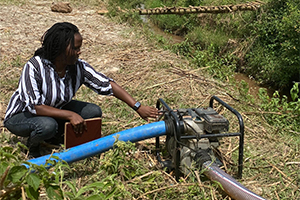
Of Rwanda’s roughly 600,000 hectares of irrigable land, only 10% is currently irrigated. With a more developed irrigation industry, farmers would be able to take advantage of three growing seasons, rather than one, enabling better food security and income. However, there are gaps in knowledge needed to advance the industry.
Seeking to make these advancements accessible, staff at the Daugherty Water for Food Global Institute (DWFI) have completed a study which maps and analyzes the business ecosystem for smallholder irrigation in Rwanda. The Rwanda smallholder irrigation ecosystem map shines a light on farmer-led irrigation - the distribution and use of small irrigation pumps and associated equipment by individual farmers or shared between a few farmers - and analyzes the business ecosystem for providing those goods and services.
To accomplish the study, the DWFI team held discovery interviews with dozens of farmers, irrigation entrepreneurs, agronomists, policymakers, and investors.
Key findings from the study are:
- All irrigation pumps are currently imported into Rwanda.
- The distribution channel for irrigation pumps flows from the manufacturer to a wholesaler or retailer, then to the smallholder farmer.
- The government-run, Small-Scale Irrigation Technology (SSIT) program subsidizes and purchases some irrigation equipment and influences the entire market.
- Government agronomists at the sector and district level are key influencers in irrigation pump marketing channels.
- Non-governmental organizations, whose business models include knowledge aggregation and financial intermediation, play an important role in the growth of smallholder irrigation in Rwanda.
Based on these findings, the team laid out several challenges, opportunities and recommendations for the industry, including adjustments to the SSIT program, opportunities for retailers to provide repairs and spare parts, and opportunities for youth entrepreneurship.
“This can be a tool for anyone interested in the irrigation industry,” said Natacha Akaliza, DWFI program consultant who researched and co-wrote the report. “I think it could speed up the process of advancing the Rwandan irrigation industry because it is adapted to local policies and culture. It can also serve as a blueprint to be adapted for other countries where there is interest in investing in agriculture. It can provide a lot of knowledge.”
The full study can be read online, and a video interview with the research team can be viewed here.


